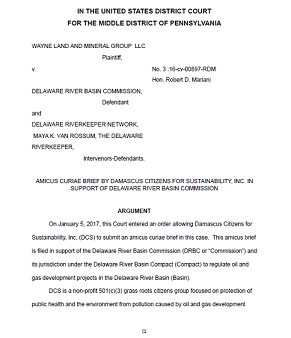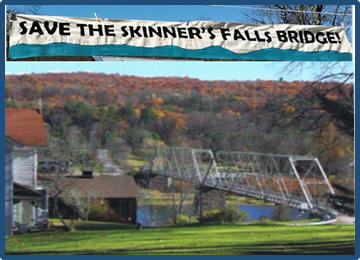DCS at the DRBC Meeting to Urge a Ban on Fracking in the Basin
February 16, 2017Join the Global Movement for Fossil Fuel Divestment
February 24, 2017Victory! Case dismissed! Court rules that the DRBC can regulate fracking in the Basin. Plaintiff may appeal.
In May of 2016 the Wayne Land and Mineral Group filed suit in federal court challenging the authority of the Delaware River Basin Commission (DRBC) to regulate natural gas drilling in the Delaware River Basin (DRB). DCS has responded with an Amicus brief, presenting to the Court the “devastating impacts that would follow in the Basin if this Court determines that the Commission does not have the authority to regulate – including the authority to ban — fracking in the Basin.” Excerpts from the brief follow:
“This amicus brief is filed in support of the Delaware River Basin Commission (DRBC or “Commission”) and its jurisdiction under the Delaware River Basin Compact (Compact) to regulate oil and gas development projects in the Delaware River Basin (Basin).”
“Since its inception in 2008 DCS has seen a growing number of cases where individuals and communities outside the Basin have suffered serious health impacts from pollution caused by fracking near their homes and communities or upstream from them. DCS and its members are very concerned that similar types of fracking impacts would occur in the Basin if fracking activities are determined to be beyond the control of DRBC.”
“The purpose of this amicus brief is to better inform this Court about the adverse human health impacts that have been caused by oil and gas development using fracking in areas outside the Basin that are not subject to the Commission’s project review authority.”
Documents supporting the brief include:
- DCS Exhibits, including a letter from the League of Women Voters
- Compendium of Scientific, Medical, and Media Demonstrating Risks and Harms of Fracking
- Hydraulic Fracturing For Oil and Gas: Impacts From the Hydraulic Fracturing Water Cycle On Drinking Water Resources In the Unites States
- A Public Health Review of High Volume Hydraulic Fracturing for Shale Gas Development
“The Compendium collects over 900 scientific studies, federal and state reports, and media reports related to adverse health impacts from fracking. Dr. Larysa Dyrszka, co-founder of Concerned Health Professionals of New York and a member of DCS, summarizes the lessons from the Compendium this way, ‘Our extensive literature compilation and analysis demonstrates without question that the harms (of fracking) are far greater than any benefits, and that the list of such literature is increasing exponentially.’ She summarizes the current situation with fracking as follows:”
“At issue is not just what we know. It is what we still do not know, such as the identification and effects of all the endocrine disruptors in industry components that leach into groundwater and pollute the air, the amount of radioactivity that can impact the waters and as a consequence people who drink it, and the toll such impacts will have on all people, but importantly, the most
vulnerable. Some of the chemicals used in [fracking] cause fetal demise and congenital defects; some cause exacerbations of asthma and neurological problems; others have effects long-term and cause cancer. That toll will be paid in health care expenditures, lost school and work, and even deaths. Regulations, even with the best intentions, have not worked to protect health. Fracking and the proliferation of the infrastructure that supports it is an inherently dangerous, highly industrialized process that no regulations have been able to make safe.“
“The total impacts from fracking nationwide have not extended to the Delaware River Basin because the Commission has supported the moratorium on fracking embodied in the Executive Director’s determinations in 2009 and 2010. This litigation challenges the Commission’s authority under the Compact to protect the Basin, including the tens of millions of water users who depend on these water resources every day.”
“We have laid out in this brief and its exhibits some of the devastating impacts that would follow in the Basin if this Court determines that the Commission does not have the authority to regulate – including the authority to ban — fracking in the Basin.”
With your support, we can ban fracking in the Delaware River Basin!
See DCS comments to the DRBC on the Water Resources Program FY 2017-2109




